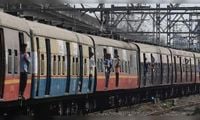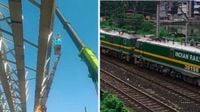Thousands of commuters faced significant inconvenience on Friday morning as the Central Railway suspended local train services between Thane and Vashi due to a tilted girder that was launched for a bridge under construction. The incident, which occurred on May 9, 2025, highlights the ongoing challenges of maintaining infrastructure safety amid rapid urban development in Mumbai.
Local train services on the Trans-Harbour line connecting Navi Mumbai and Thane were abruptly halted, leaving many passengers scrambling for alternative transportation options such as buses and auto-rickshaws. This disruption affected thousands of daily commuters, who rely heavily on suburban trains as a lifeline for their daily travel needs.
A railway spokesperson explained that the suspension of services was implemented at 7:10 am as a precautionary measure after it was discovered that one of the girders, which had been launched during overnight construction work by the Mumbai Metropolitan Region Development Authority (MMRDA), was tilted. The MMRDA had initiated the launch of ten girders between 1 am and 4 am for the new Airoli-Katai Naka link road.
According to reports, the issue with the tilted girder prompted Central Railway to take immediate action to ensure passenger safety. Trains on the main line were delayed by over 30 minutes, compounding the frustration of commuters. Harshal Joshi, a regular commuter from Vashi, expressed his annoyance, stating, “There was no information on the app or any prior alert. I waited for almost an hour before learning about the suspension. If such technical work is scheduled overnight, authorities should ensure it doesn’t affect peak-hour travel. It is very frustrating.”
Restoration work began at 8:15 am, with officials aiming to complete it within half an hour. However, at the time of reporting, no estimated time for full service restoration was provided. The railway authorities urged passengers to monitor updates through official channels and assured that work on restoration was being prioritized.
This incident is not an isolated case. Just weeks prior, the Western Railway announced a 35-hour mega block on its suburban corridor for regirdering work of a bridge between Kandivali and Borivali, which also caused significant disruptions to train services. Such occurrences underscore the pressing need for robust infrastructure planning and execution to prevent disruptions that impact daily life and economic productivity.
Experts have raised concerns about the quality control measures and oversight during construction activities, particularly in light of the tilted girder incident. Ensuring the structural integrity of infrastructure projects is paramount to safeguard public safety and maintain trust in public transportation systems. The necessity for contingency planning and efficient communication strategies to manage unforeseen disruptions is also critical.
As Mumbai continues to expand and modernize its infrastructure, balancing development with safety and sustainability becomes increasingly essential. Incorporating eco-friendly and resilient design principles can enhance the durability of infrastructure projects and reduce the likelihood of such incidents occurring in the future.
In the interim, commuters are advised to stay updated through official channels and plan their travel accordingly. The incident serves as a stark reminder of the interconnectedness of infrastructure integrity and daily life in urban settings. With the ongoing challenges posed by rapid urbanization, it is crucial for authorities to conduct thorough investigations into incidents like the girder tilt to identify root causes and implement corrective measures.
Transparent reporting and accountability are essential to prevent recurrence and ensure the safety of ongoing and future infrastructure projects. As the city grapples with these challenges, the need for effective communication and timely information for commuters cannot be overstated.





